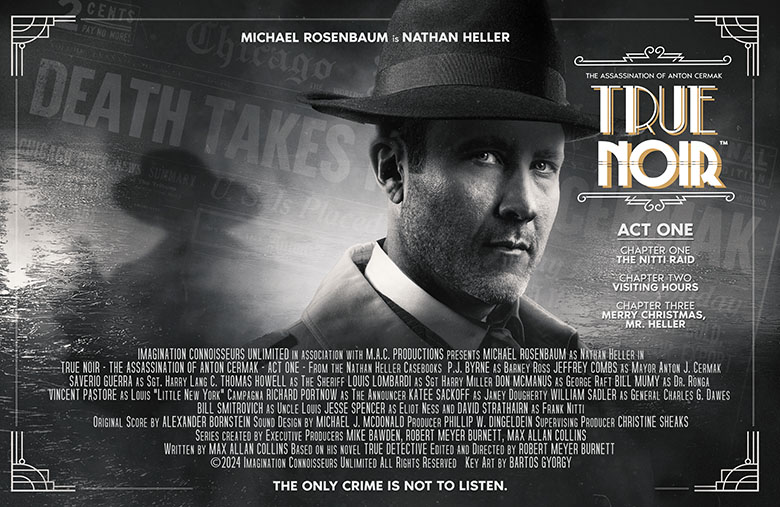Barb and I did a book signing at Greenpoint Mercantile, as part of the annual holiday stroll here in Muscatine. Thanks to this new bookstore and to those who dropped by to chat…and to buy and chat especially.
Just around the corner, our Blue Christmas/Death by Fruitcake star Alisabeth Von Presley was doing her thing, with my film-making crony Chad Bishop at the controls.
Alisabeth is a force of nature!


Let’s discuss reviews.
The baseline of this one-sided discussion is a truism: no two people experience a work of art the same way. A book is the author plus the reader. A film is the movie plus the audience member. A painting is the canvas plus the viewer. This, like all truisms, should be obvious. And yet people argue about whether a novel, say, is a masterpiece or stinks on ice, and every stop in between.
Several things have occurred in recent years that have frustrated any worthwhile discussion of (let’s say for the sake of argument) a novel or a feature film. Reviews used to be the domain of professional reviewers – individuals who worked for a newspaper or perhaps a radio or television station, and presumably had credentials for such work. In recent years – starting with the Internet and careening into the Social Media era – anyone, everyone, is a critic. This is democracy. But democracy is sloppy. And the end result seems to be that everything is judged, minus nuance or context, as either good or bad.
I am thinner-skinned than a professional writer should be. I will brood over a bad review – not long, but enough to make it hard to get to sleep for one night. However. My thin skin has less to do with criticism and more to do with marketing. In other words, I view a good review as something that generates sales, and a bad review as something that lessens sales. The audience, or I should say potential audience, doesn’t necessarily know the difference between an informed review and an unprofessional one.
Which is not to say informed reviews are necessarily “right” – but they are opinions that might reasonably be taken more seriously. And that is largely lost.
Anthony Boucher, probably the greatest reviewer of mystery fiction who ever lived (and a fiction writer of some skill himself), hated Mickey Spillane’s work on the initial publication and success of the Mike Hammer novels. But as the years passed, he re-evaluated Mickey, and came to (somewhat grudgingly) revise that opinion and become an advocate of Spillane as the last of the great pulp fiction writers. That indicates thought, and growth, and yes nuance, on Boucher’s part.
I distrust reviews as they pertain to my potential growth as a writer. That may seem counter-intuitive, as if I want to improve, listening to criticism makes sense. But writers of fiction must have confidence and conviction in what they are creating. Allowing a bad review to undermine you – or a good review to give you a swelled head – is not productive.
There’s an argument, and not a bad one, that if you allow yourself to believe the good reviews, you have to believe the bad ones, too. That however, it seems to me, would lead to mental whiplash or maybe the onset of a bipolar condition. A more nuanced approach would be for a writer (or filmmaker) to consider each opinion on its own merits, and while this makes sense, it can get in the way of the creative process – it leads not to creativity but to second-guessing yourself.
When my first two novels came out in January 1973, I was fairly well-known in small-town Muscatine (pop. 25,000) largely due to my father, Max Allan Collins Sr., who was the director of a national-championship men’s chorus, a beloved former high school music teacher and a choir director at the Methodist Church. If I am half the writer he was a musician, I must be pretty damn, excuse me darn, good.
So eyes were on me when I published Bait Money and Blood Money. And I expected praise. And I got some. But mostly I got dirty looks and dirtier comments because my novels were considered by local residents as, yup, dirty. Should I have taken this criticism to heart and cleaned up my act? Fuck no. Did it hurt my feelings? A bit. Surprised me, more than anything.
My attitude toward reviews, good and bad (few are in between in these black-and-white times) is, “Is there a nice quote that can be pulled from here?” Not that I am either a genius or a fraud. Bad reviews are worthless because you can’t pull a quote for promotional purposes. There was a time, when a mixed review was more common, that you could pull a quote and leave the rest behind, including negatives.
Do I ever allow myself to be seduced by a really terrific review? You bet. Briefly. Do I ever allow myself to be hurt by a really cruel review? Sure. Briefly. But mostly it’s, “That’s going to be helpful!” Or, “That’s not going to be bring some new readers in!”
None of this means that a thoughtful, well-written negative review can’t be helpful. There’s less of that these days because of the this-book-is-fantastic, this book-sucks-donkey-dick dynamic. Also, politics has started to enter in. I first noticed that when Matt Clemens and I got negative Amazon reviews from far-right readers about Supreme Justice – when the book wasn’t available yet, not even advance reviewer copies.
As absurd as that is, it does come back to the point that a book, a movie, a painting, is the artist plus the recipient. That’s especially true with a novel – with a movie, everybody sees the same narrative; they take it in differently, but it’s a shared visual experience. A novel is a movie that plays in the head of a single reader. And sometimes you play at an arthouse, sometimes the local multi-plex, and other times at the Three Mile Island Community Playhouse.
Movies are hostage to their budgets. The most money I’ve ever had to make a movie is half a million dollars. Most recently, I’ve had eight grand to make Blue Christmas and twenty-four grand to make Death By Fruitcake. Before that, Encore for Murder had zero budget – it was strictly a local production I recorded and edited (with Phil Dingeldein and Chad Bishop respectively).
And yet.
I recall back in the early ‘80s when I’d hear from Paul Reubens with a late-night phone call where we’d discuss the Pee-Wee Herman movie he was trying to get off the ground. When he got Warners Bros on board, he was concerned about budget. I told him, “The more money they give you, the more trouble you’ll have.” He said he agreed with me, but not to tell Warner’s. As it was Pee-Wee’s Big Adventure had a modest budget and a terrific unknown director and did just fine.
If a reviewer – a viewer – doesn’t have a sense of scale, of making an effort to meet a movie on its own level, the filmmaker is screwed. Last week, I shared with you a wonderful review of Blue Christmas from a professional critic whose work I admire. Getting that review, I admit, felt great.
But a day later we got a review that dismissed us as low-budget bilge. The reviewer was nobody I’d ever heard of, but I’m sure he has an audience. And I get that when you are used to seeing movies made for hundreds of millions of dollars, or for just a paltry five or ten million, an eight-thousand-buck “blockbuster” like Blue Christmas may be difficult to meet on its own terms.
But a reviewer should try. We all should meet art on its own terms (and I use the word “art” to cover a lot of ground, and perhaps “craft” would be more appropriate). Blue Christmas, a little micro-budget movie that I am pleased with, was worth making. I have been trying to get it done, in various ways, on assorted levels, since 1994. Finally, with my own clock winding down, I came up with a way to do it on a very limited budget, and now – for better or worse (and I obviously feel it’s better) – Blue Christmas exists. (It’s still available as I write this for under two bucks at Amazon Prime; and the Blu-ray release from VCI is pretty nifty, by my biased standards.)
Allow me, if you will, a sidebar about the cast of my little movie. It’s a large cast for a micro-budget production – twenty-four – and consists of professionals, semi-pros (day-job folks who appear in, for example, regional dinner theater), and community theater amateurs. I am grateful to them, every one of them. Our top-billed duo, Rob Merritt and Alisabeth Von Presley, are both well-known in this corner of the world and are film-festival award-winners for their performances in Blue Christmas.
I am pleased and proud to say that we’ve had mostly good reviews for Blue Christmas, a few of which have been raves or nearly so, outnumbering a handful of bad ones.
Now after all that, I’m going to share a really good review with you, our first, for True Noir (based on the first three episodes), the budget for which was around $250,000 and whose cast is overwhelmingly stellar. The review is written by a professional fiction writer and literary critic, by the way.
Here it is:
Crisply directed and impeccably edited by Robert Meyer Burnett, based on Collins’ excellent screenplay treatment of his own novel, the audio drama drops listeners into an aurally vibrant and thoroughly realized 1932 Chicago, where we follow the shady power plays of characters both fictional and historical. Michael Rosenbaum brings Nate Heller to life with a captivating blend of playful gusto and sensitivity, pulling double duty with a voiceover simultaneously dynamic and velvety. The stacked supporting cast, which includes Bill Smitrovich, David Strathairn, and Katee Sackhoff, unfailingly deliver performances that pop with nuance and flavor. Michael J. McDonald’s phenomenal sound design, which expertly suggests spatial relationships through the subtle manipulation of audio channel elements, such as floating wisps of background dialog, further orchestrates the drama’s heightened sense of reality. Ingenious transitional effects, like traveling through a telephone wire or experiencing a sensory flashback, invent a whole new vocabulary of acoustic alchemy. Alexander Bornstein’s tastefully interspersed original score, with its sultry jazz influences, smoky sax tones and melancholy piano chords, evokes the best retro-noir scores of the twentieth century, like Jerry Goldsmith’s
Chinatown, John Williams’ The Long Goodbye, and John Barry’s Body Heat. We can only hope for its eventual release as a standalone presentation.World-building is a term commonly applied to literary and visual media – but
True Noir proves that with the right team at the conductor’s podium, it can be equally batoned to mesmerizing effect just through sound. In a smoky netherworld somewhere between bitter memory and bygone dream, the ambiance-drenched True Noir is the perfect marriage of our past’s most beloved tried-and-true storytelling tradition with the latest cutting-edge technologies of creative soundscaping. The play’s still the thing, and this one hits all the right notes.—-Author & critic Alvaro Zinos-Amaro
I will add only one slight correction – I’ve never written a screenplay version of True Detective. My adaptation was based on the novel itself, and is to a degree screenplay-style.
Alvaro Zinos-Amaro is the author of the well-regarded 2024 novel, Equimedian.

Here is a great review of the new Ms. Tree collection by Terry Beatty and me, Ms. Tree: Fallen Tree. (Scroll down a bit.)
Never heard my punk classic (let’s make that “classic”), “Psychedelic Siren”? Now’s your chance.
There’s some interesting stuff about Road to Perdition as a graphic novel that inspired a big-time Hollywood movie right here.
Never mind what I said above about reviews – this one from Paperback Warrior about the current Quarry’s Return is a honey! Exactly what I wanted for Christmas.
M.A.C.
Tags: Bait Money, Blood Money, Blue Christmas, Daybreakers, Death by Fruitcake, Death by Fruitcake Movie, Ms. Tree, Ms. Tree: Fallen Tree, Nolan, Psychedelic Siren, Quarry, Quarry's Return, Reviews, Road to Perdition, True Noir, True Noir: The Assassination of Anton Cermak, True Noir: The Nathan Heller Casebooks
My review of BLUE CHRISTMAS? Having read your short story, I was excited to see it on the screen. And I loved it! I bought it (not just rented it), on Prime so I can watch it every holiday season! I’ve watched it once, and I’ll be watching it at least one more time this holiday season!
My book was published earlier this year (not in the mystery genre, nor fiction for that matter) and I decided to go the route I was taught as an actor in college – do not read reviews (as you point out it means taking the good with the bad, if you do read them). . Should I ever decide I need to try to lift review quotes for advertising purposes, I would probably ask a friend or pay someone to do it.